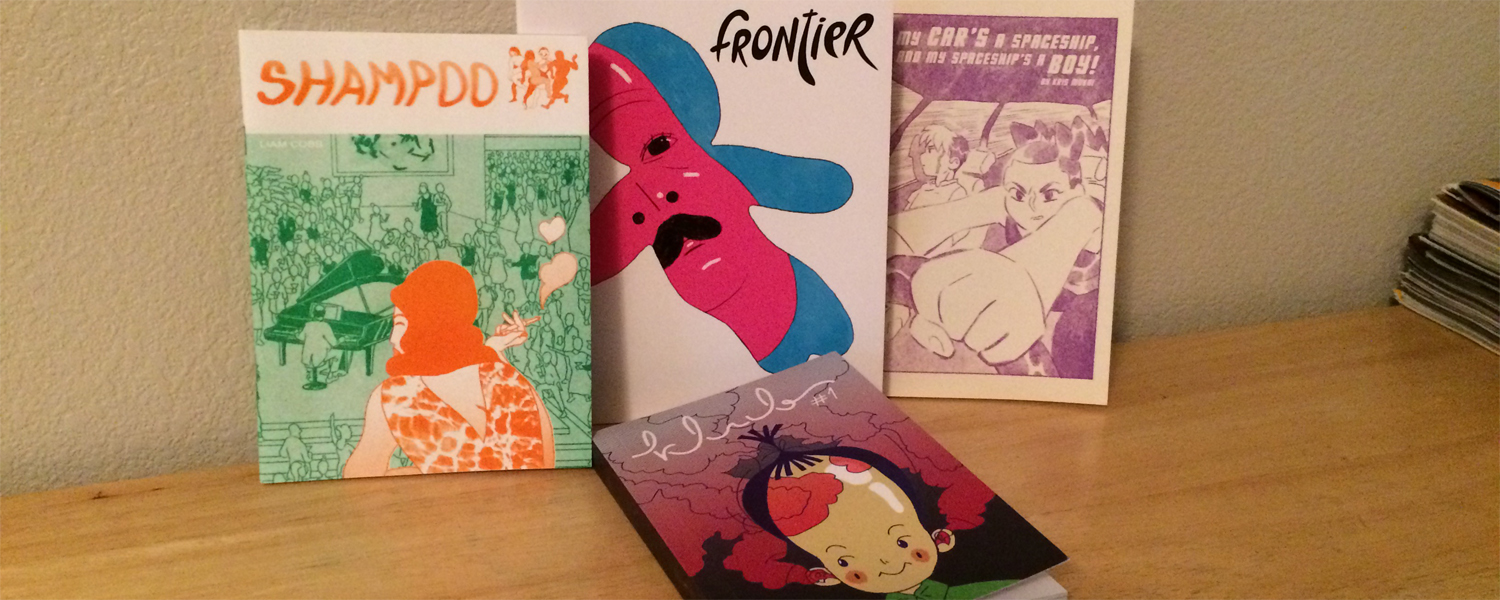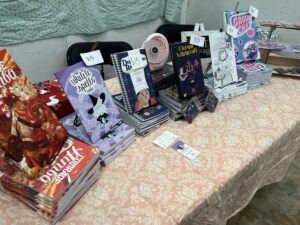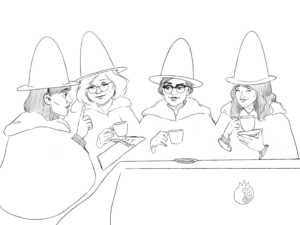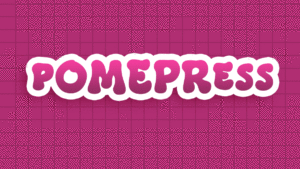Another month, another batch of excellent cartooning available for purchase via the internet. Not too much to say about these other than they’re good and none are quite as new as when I started writing this. Enjoy!
Frontier #13 (Fatherson) – Richie Pope

Richie Pope’s affinity for vivid color was the first thing I noticed while reading Fatherson, his fictional user guide to consumer-packaged parental figures and the latest issue in Youth in Decline’s artist spotlight series. Pope draws and colors his book in a modified CMYK, substituting pumpkin orange for the typical yellow and adding a light purple to round out his palette. These colors are used expressively rather than descriptively and, with their help, Pope’s linework pops out excitedly from the white negative space of each page’s background. In the back of the book, Pope writes that he was inspired by “vibrant pills and medicine packaging” but that he also wanted to contrast these “candy colors” against “the stoic archetype” of black fatherhood. And these colors do contrast with stereotypical notions of masculinity, giving a flamboyant festivity to the depicted manly pastimes of eating meat, sports and fighting. It’s a move that’s both teasing and loving, like planting a kiss on the cheek of a male relative who doesn’t believe in men showing affection.
But coloration isn’t the only area where Pope skillfully manipulates an ironic divide between presentation and content. Fatherson filters its subject matter through an intentionally generic format (the consumer instruction manual, designed to communicate widely and unambiguously), but family relationships are too personal and complicated to be so reduced. And while the Fatherson, like other products, is meant to exist only for the consumer starting at the moment of purchase, real parents cannot exist outside of history, even for the sake of their children. Amongst the fun antics of the Fathersons who will shoot hoops with you and build extensions on your house without asking permission are the Fathersons who will “simply be upset” and “never tell you why” and the Fathersons who “run so far they forget who they are.” These moments in Pope’s book suggest the real distance which can exist between fathers and sons (or, really, between any parent and child). The Fathersons are presented in their outer actions but not their inner lives, and it’s up to the reader to try to fill in the gaps of motivation, much as a child would.
The irony climaxes on the comic’s last page, where the premise is stretched to the point of tearing. After being led through the many possible (and sometimes conflicting) varieties of Fathersons, the reader is informed that unsatisfactory Fathersons can always be returned to the store “for credit towards another.”. In the fantasy world of consumer goods, this of course makes sense, but as readers we are comically (and tragically) aware that real families aren’t that simple and our histories are not mutable for our convenience. From behind Pope’s clean linework and bright colors, a far messier reality pokes its head out and winks.
More of Richie Pope’s illustration work can be found at his personal site and Frontier #13 can be purchased from the Youth in Decline site.
Shampoo – Liam Cobb

The red of flame overwhelms a modernist home during a high-society party. Rippling lights play off of water and mirrored walls at the top of a mysterious building. Hair grows uncontrollably as two men entangle themselves in each other and vanish into the jungle. Texture, pattern and color dominate in Liam Cobb’s new mini and although his comics retain vestiges of narrative, they are unapologetically visual. The three stories in Shampoo advance and conclude with a solemn air but minimal detail or exposition, in the style of allegories. Their blank protagonists only barely retain their status as focal points over the intricately rendered backgrounds. Little happens plot-wise that sticks to the memory but, in contrast, the experience of seeing each comic feels immediate and enduring. Each story is given its own color palette and a unique set of textural motifs that are a joy to watch unfold. This is probably the most “arthouse” book I’ve reviewed so far, the comics equivalent of the type of movie you play on mute during a hip party. But hey, treat your eyes once in a while, why don’t you?

I first encountered Cobb’s work a few months ago when I reviewed a three-man mini-anthology he was part of called Silica Burn. His contribution there shared the newer works’ aversion to detail and preoccupation with architecture, but these newer comics feel a lot stronger to me, more confident and more visually inventive. His work can be followed here and Shampoo can be purchased from this site.
My Car’s A Spaceship, And My Spaceship’s A Boy! – Kris Mukai

It’s rare that a book’s title so accurately conveys both its contents and its tone, so props to Mukai on this one, even if it took a mouthful to get there. MCASAMSAB! is a 32-page introduction to a hyper-kinetic sci-fi universe of bounty hunters, space flight and petulant gas station attendants. Mukai’s approach to the genre is straight-forward but fun, jumping the reader right into the action and answering questions before they can even be asked. The main character is Maple Kingston because the first page says so. Kaeda Ueno is both a boy and a spaceship but he is emphatically not a cyborg. The minicomic flows breathlessly from Maple arguing with the aforementioned gas clerk to a bungled robbery and fist fight into a high-speed escape which closes out the book. All of this is held together by Mukai’s impeccable cartooning, which renders just about everything that happens in MCASAMSAB! delightful. Her chibi-esque characters have wonderfully expressive faces and the action sequences are dynamic but easy to follow, with each blow or object landing in a satisfyingly slapstick manner. Mukai delivers a lot here but I hope there’s more to come, because this is a universe I wouldn’t mind spending some time in.
See more at Mukai’s site and cop the mini here.
klub zin #1: problems – Various Artists (edited by Anna)

Few anthologies excel at coherence as a book (and, to be fair, few really try) but any reasonably-well edited anthology can succeed through the lunch buffet virtues of variety and novelty. This Polish anthology leans towards the former course with a guiding theme of “problems” but mostly follows the latter, offering a print sampling of internet talent perfect for visual snacking. The comics in klub zin are short, with the longest running to fourteen pages but most coming in at about four or six. Combine this with the fact that about half of those comics consist of essentially one- or two-panel pages (93/173 and, yes, I counted), and you have a breezy read, even with 26 different contributors. klub zin #1 is undoubtedly packed with talent, but few of the entries feel like they could stand alone, though they certainly whetted my appetite for more of each artist’s work. Of course, that sort of introduction may be as good an excuse as any for a zine like this, and I was more than happy to make some discoveries here. The book is well curated and I started following almost all the artists on tumblr immediately after putting it down (another statistic and sign of the times: 19/26 of the books’ artists list a tumblr as their website).
A few stand-outs:

Anabel Colazo’s comic about a little gremlin following around a girl. Cute drawings and digital gradients that actually look good.
Elevator Teeth’s opaque, clip-art meditation.
Hakobore’s pencily manga about an introspective game of would-you-rather?

Tara Booth’s gross-out gouache list of micro-complaints.
Renata Gasiorowska’s story about a worn-out mouse paramedic.
This comic by Ville Kallio whose work I talked about a while ago..

Ala Flora’s dense, gorgeous digital painting in her comic about forest critters.
klub zin #1 can be purchased here and I’ve linked the above contributors’ tumblrs where possible.




